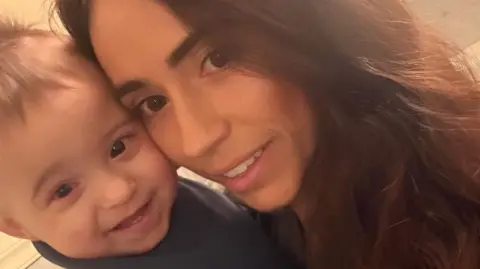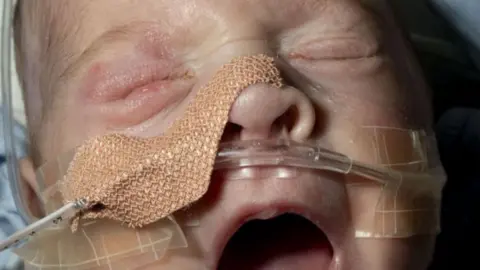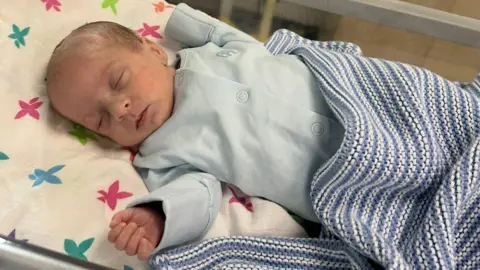Baby who got ill from mum's cold sore has transplant
 PA Media
PA MediaA baby who contracted his mother's oral herpes in the womb is thought to be the youngest child to receive a corneal transplant at Bristol Eye Hospital.
Brooke Hale, 28, described her terror after her son was born 12 weeks early, looking "burnt all over" and blind in one eye.
Luca weighed just two and a half pounds at birth and had "red raw" skin.
Doctors thought he had a skin condition, but tests on Brooke's placenta showed he had been infected with HSV1, a type of herpes linked to cold sores which is harmless for adults but dangerous for babies.
Both Brooke and her husband Luke, 41, have the common HSV1 - herpes simplex 1 - a lifelong virus which affects around 70% of the UK population.
Both parents never thought that it could be passed on during pregnancy and have two other daughters Sofia, five, and Bella, three, who were not affected.
While HSV-1 is often harmless in adults, it can be life-threatening for babies because their immune systems are not yet fully developed.
Luca, who was born at St Michael's Hospital in Bristol in December 2023, spent 12 weeks in the neonatal intensive care unit there.
He lost the sight in his right eye after the virus spread to his cornea and is still drip-fed medication around the clock to prevent flare ups.
Earlier this year, on 10 October, Luca became the youngest patient to have a cornea transplant at the Bristol Eye Hospital.
 PA Media
PA MediaThere are only around 6.9 cases of neo-natal HSV per 100,000 live births in the UK, according to research published in the British Medical Journal in 2021.
"It's very, very rare for the HSV1 virus to transfer in the womb - the consultant said they had never seen a case at St Michael's before," Mrs Hale told the Press Association.
"Luca was two and a half pounds when he was born, which in itself is quite scary," she said.
"His skin looked like it had been burnt all over - it was red raw, and he was obviously tiny.
"But he is the happiest boy. He'll have an operation and be laughing straight away like nothing seems to phase him."
Brooke said she is really looking forward to spending Christmas with her family as last year Luca was in hospital.
"It feels like Luca's first Christmas even though it's technically not," said Ms Hale.
"We put the decorations up last weekend - it was quite emotional."
 PA Media
PA MediaMrs Hale said her first pregnancy scans showed that Luca was healthy. But concerns were raised when she had a 4D ultrasound on 8 December 2023.
Four days later, after experiencing what she thought to be Braxton Hicks contractions, Mrs Hale gave birth to Luca at 28 weeks, or 12 weeks earlier than expected.
"It took him a good five minutes to breathe on his own, and they took him straight from me and put him in what looked like a plastic bag to keep him warm," said Mrs Hale.
"I remember just looking at him, and at that point I started crying because it was a lot to take in," she said.
"His skin was so sore - every time you touched him, he just squealed. They were spraying him every four hours with Vaseline."
After 12 weeks in hospital, Luca was discharged on 22 February 2024.
Mrs Hale has praised staff at St Michael's Hospital and launched a fundraiser on GoFundMe to help raise money for the hospital's neonatal intensive care unit, which has so far received £7,000 in donations.
Follow BBC Bristol on Facebook, X and Instagram. Send your story ideas to us on email or via WhatsApp on 0800 313 4630.
